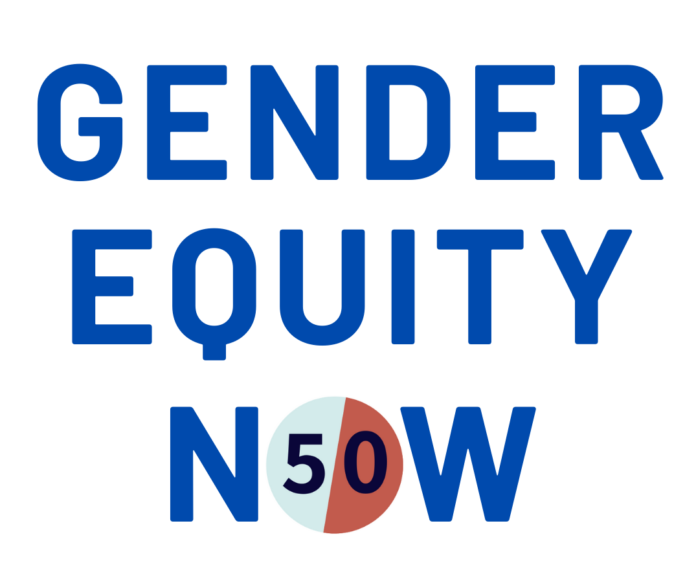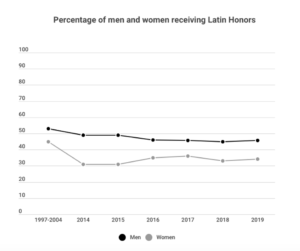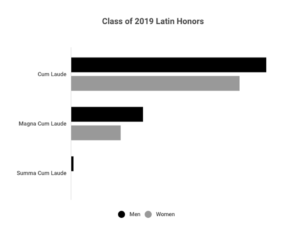1. Introduction
For five consecutive years, the Women’s Law Association (WLA) has published a statistical analysis of Latin Honors and gender at Harvard Law School. For all five years, that study has found a statistically significant difference between the number of men and women graduating with Latin Honors, as compared to the expected numbers based on the gender breakdown of each class.
Women in the Class of 2015 received only 36.9% of Latin Honors awarded. For the Class of 2016, women received 43.2% of the awards. In 2017, the number decreased to 41.7%. For the Class of 2018, this number decreased again to 39.7%. Last year, women received 44.5% of the Latin Honors awards for the Class of 2019. This means that 45.6% of the men in the class of 2019 received Latin Honors, compared to only 34.1% of women. This is not the kind of improvement we would have hoped to see over a five-year period, especially one in which massive strides have been made for equity elsewhere on campus.
In stark contrast to the persistent Latin Honors gender gap, the past five years have seen three of HLS’ most prominent by-application student organizations – Harvard Legal Aid Bureau, Board of Student Advisors, and Harvard Law Review – achieve gender parity. All three organizations have even had majority female membership at times. This is the kind of progress that we would have hoped to see for Latin Honors disparities.
Of course, these gender disparities are not unique to Harvard. At the University of Chicago Law School, the Women’s Advocacy Project (WAP) produced a comprehensive report on gender equity in 2018. In that study, the WAP found gender disparity in academic achievements such as Latin Honors and writing prizes, representation on journals and the Law Review, the clerkship process, moot court, and class participation and general academic satisfaction. Notably, the WAP received university funding that was not conditioned on the outcome of the report.
For its 50th anniversary, the WLA is similarly conducting an Equity and Inclusivity Survey to gather data on these issues as they manifest here at Harvard. Unlike the WAP report, this survey has not received financial support from the university. Once the study results are available in fall 2020, the WLA looks forward to using its findings to improve the HLS experience for all genders and achieve true gender equity here at Harvard. We sincerely hope that the HLS administration will work with us to take action based on the results of the survey. We may have seen five years of consistently discouraging data, but it’s not too late to change the status quo for Latin Honors for the Class of 2021.
II. The Data
A. Methodology
This year’s study focused on Latin Honors awards for the class of 2019 and the membership of the Board of Student Advisors, Harvard Legal Aid Bureau, and Harvard Law Review during the 2019-2020 school year. Because HLS does not keep data on gender for Latin Honors or membership in any of these groups, the WLA gathered all information independently. Where possible, we used self-reported data on gender. All three student organizations collect this data, but HLS is unwilling to provide data on Latin Honors broken down by gender. As in past years, we guessed the gender of students who received Latin Honors using online searches. This method is highly problematic given the assumptions that must be made about gender identity, and, as in past years, we encourage the HLS administration to begin collecting and analyzing data on gender and Latin Honors independently.
We then calculated the “expected” proportions of men and women for each of the four categories, based on a comparison to the number of men and women in the relevant graduating classes. We used a Chi-Square fit test to determine whether any of these differences were statistically significant. It is important to note that this gender binary lens is artificial and does not reflect students who are non-binary. This is a major flaw in our methodology and one that can only be solved through self-reported data on gender. We implore the HLS administration to assist us in obtaining self-reported data on gender in future years.
B. Results
As seen last year, HLS’ three most prominent by-application student organizations have achieved gender parity in their membership. The membership of the Harvard Legal Aid Bureau and the Board of Student Advisors consists of a majority of women this year. In the case of the Board of Student Advisors, this difference is statistically significant (c2= 4.22, P < 0.04). The Harvard Law Review has an even number of men and women on its staff this year, but has had a majority female staff in the past. These organizations have actively recruited women over the past few years, and their efforts have paid off. We are grateful to all three organizations for their continued commitment to gender equity at HLS.
Unfortunately, the story is very different for grading at HLS – a trend that the WLA has seen year after year in our annual analysis. This year’s analysis found a statistically significant difference between the number of men and women graduating with Latin Honors in 2019, even after controlling for gender representation within the class (c2 = 4.75, p < 0.0293). Of men in the Class of 2019, 45.6% received Latin Honors, compared to only 34.1% of women. Of those receiving Latin Honors, men received 55.04%, while women received 44.54%.
This gender achievement gap has been a persistent issue at the law school and has remained relatively consistent over recent years. This year’s data reflects no significant change between the amount of men and women receiving Latin Honors this year as compared to the data for the last five years. Although the gap between the percentage of male students and female students receiving Latin Honors appears to have been narrowing very slightly in the recent past, its relative stagnation indicates that it is not closing anytime soon.
The data indicates that the law school’s status quo policy of blind grading in larger courses is not enough to achieve gender parity in academic performance at the law school, and more concerted efforts by administrators and faculty are necessary to remedy this disparity.
Harvard may pride itself on diversity, but it has vast amounts of work to do to achieve equity among its student body. It is incumbent on the law school to investigate and address this concerning trend, in dialogue with professors and students, whose input is vital to devising appropriate solutions. In the WLA’s experience, however, the law school has been unresponsive and slow to move on this vital issue.
III. What We’re Doing About It
In light of the administration’s failure to investigate the ongoing lack of gender parity at HLS and in celebration of its 50th anniversary, the WLA launched its own study of gender equity and inclusivity at HLS this year. The WLA is conducting the survey to broaden the understanding of the different ways in which people of all genders experience the law school. Given that it has been over fifteen years since a comprehensive study of this kind was conducted, an updated study on the student body is crucial for determining what factors improve or inhibit the success of women at HLS.
This survey, which was conducted in February and early March of 2020 and will be published in fall 2020, will provide crucial data to further gender equity at HLS. In addition to capturing students’ overall assessment of their experience at HLS, the survey aims to gain a better understanding of how students spend their time at HLS, what challenges arise in the classroom environment, and how supported students are by faculty in their academic and professional careers. Unfortunately, this survey has proceeded largely without transparency or support on the part of the university.
Once the survey analysis has been completed, the WLA hopes to work with the administration to translate its insights into concrete improvements for students of all genders at HLS. Going forward, we hope that Harvard will hold itself accountable for the persistent gender disparities that afflict its student body. Once armed with data, the WLA is confident that we can break through Harvard’s glass ceilings in the coming years.




